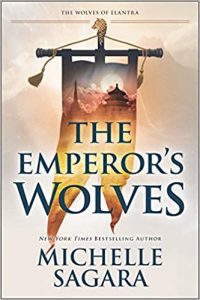Maya C. James Reviews A Taste of Gold and Iron by Alexandra Rowland
 A Taste of Gold and Iron, Alexandra Rowland (Tor 978-1-250-80038-1, 512pp, $27.99 hc) August 2022.
A Taste of Gold and Iron, Alexandra Rowland (Tor 978-1-250-80038-1, 512pp, $27.99 hc) August 2022.
Reputation is everything in Araşt, the setting for A Taste of Gold and Iron by Alexandra Rowland. While other kingdoms are plagued with counterfeit coins, the princes of Araşt have the ability to test the purity of metals through touch and taste. Though it does not have the strongest army, its esteemed channels of diplomacy keep their kingdom in good graces with others. When Kadou, the prince of Araşt and brother of the sultan, Zeliha, becomes embroiled in a conflict with the Oissikan ambassador to Araşt at court, he offers to investigate a break-in to one of their guilds to save their reputation and prove his loyalty to his sister. Accompanying him is Evemer, his handsome and aloof bodyguard, who despises the prince for his cowardly actions. This small favor turns out to be more than he begged for – there’s trouble of some sort brewing, and it’s getting increasingly complicated the further he digs in.
What follows is a witty and romantic adventure about a larger conspiracy and palace politics that Kadou has no desire to be a part of. Tip-toeing between anxiety he labels cowardice, and a quiet intellect he keeps mostly to himself, Kadou is full of surprises. We are given the privilege of seeing into his mind and understanding how he came to this point in his life, and how the people around him view him. Kadou is as charming as he is interesting, and doesn’t seem interested in power or domination. Our first scenes of him are praying for his sister’s baby to arrive without complications. Their relationship is one of my favorite relationships in the book: they act like real siblings, only with an unusual amount of power that only one of them seems to care about. Kadou is too shy to be power hungry, but that may end up being his downfall if he isn’t more careful about who he defers to.
We also see the world through Evemer’s eyes. His seemingly strong hatred for the prince isn’t rooted in lust or love, but an intense sense of loyalty to those he loves and cares for. Rowland’s characters are exceedingly well-developed: not a single character acted unconvincingly, nor are they boring and predictable. They each have a strong sense of ethics and duty that are unique to their experiences and personalities.
I was also surprised that such a passionate, romantic cover with Kadou and Evemer midway to a longing embrace was the prelude to a hilarious book. Scenes from it are funny, with Kadou’s near-comical levels of shyness and awkwardness as baffling to witness as they are funny. Evemer provides us with insight into his behavior in a series of dry observations throughout the near 500-page long novel that are quite funny and entertaining. Amidst this, Rowland humanizes Kadou’s ‘‘flaws’’ as distinct and separate from his mental wellness.
Rowland’s world-building and attention to detail is also quite alluring: Araşti people have their own customs, as do the Oissika, where the ambassador and body-father (see: baby daddy unless otherwise stated) of the sultan Zeliha hails from. Rather than conflict being an innate essentializing matter, Rowland takes the time to explain these differences and reasons for conflict without interrupting the flow of the story. Based on a setting similar to that of the Ottoman Empire, there are clever descriptions that serve the purpose of worldbuilding while also explaining certain misunderstandings between characters.
Rowland’s characterization is worthy of tremendous praise, while the plot is consistently interesting. It was easy to follow without becoming mundane or predictable. I had no clue what would emerge next, and became so confident in Rowland’s storytelling capacities that I chose not to worry about it. Conflict was built into the plot with ease. It’s an easy read in the sense that Rowland has made the reader (and reviewer’s) experience easy yet enjoyable.
I of course love the romantic aspects of the book – particularly how it built in a tantalizingly slow manner. Like the conflict in the novel, it sits just at the edge of the page, pulling readers along. Rowland offers innovative ways of signaling tension: a stray thought here and there, a lingering suggestion of closeness – the attraction between Kadou and Evemer is obvious to the reader before it is the two men.
The fantasy elements of the novel may seem sparse at times – I felt as if I was watching a Turkish soap opera unfold in the best way possible – but Rowland gave the crowd (at least this crowd of me) what they wanted: drama, intense politics, and sexual tension. Magic, in the form of the ability to taste-test metals, was still present, but not so obviously in the beginning of the novel. As for the unfolding political drama, I’m certain that those deeply interested in finance and financial crimes would find this book even more interesting, but I found Rowland’s explanation of the depth of the conflict and the problems it could cause to be extremely compelling without being overt information dumps.
A Taste of Gold and Iron is impeccably paced and each character is clearly draw with unique motivations and personalities. Small linguistic choices, such as naming fathers ‘‘body-fathers’’ rather than making a specific claim to a child deepened the subtle gender roles, or lack of gender roles, that Rowland infuses into their created world. While it is a romantic fantasy novel, it’s also a political thriller, heist, and family saga at once. More importantly, as with any good romantic novel, I was shaking the book asking when the characters would kiss already. It was well worth the wait when they finally did.
Maya C. James is a graduate of the Lannan Fellows Program at Georgetown University, and full-time student at Harvard Divinity School. Her work has appeared in Star*Line, Strange Horizons, FIYAH, Soar: For Harriet, and Georgetown University’s Berkley Center Blog, among others. She was recently long listed for the Stockholm Writers Festival First Pages Prize (2019), and featured on a feminist speculative poetry panel at the 2019 CD Wright Women Writer’s Conference. Her work focuses primarily on Afrofuturism, and imagining sustainable futures for at-risk communities. You can find more of her work here, and follow her on Twitter: @mayawritesgood.
This review and more like it in the July 2022 issue of Locus.
 While you are here, please take a moment to support Locus with a one-time or recurring donation. We rely on reader donations to keep the magazine and site going, and would like to keep the site paywall free, but WE NEED YOUR FINANCIAL SUPPORT to continue quality coverage of the science fiction and fantasy field.
While you are here, please take a moment to support Locus with a one-time or recurring donation. We rely on reader donations to keep the magazine and site going, and would like to keep the site paywall free, but WE NEED YOUR FINANCIAL SUPPORT to continue quality coverage of the science fiction and fantasy field.
©Locus Magazine. Copyrighted material may not be republished without permission of LSFF.







